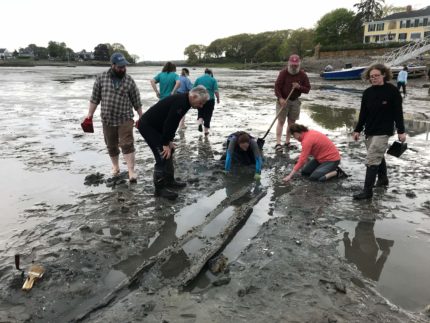A dugout canoe believed to be the oldest ever discovered in Maine has been unearthed in Cape Porpoise Harbor on the state’s southern coast. The canoe was found late last year by archaeologist Tim Spahr during a survey of the intertidal zone of the beach. The remains of the canoe had been exposed on the surface by shifting sands. The canoe, dug out of a birch tree trunk, has been radiocarbon dated to 1280-1380 A.D.
There’s an Algonquin fishing weir complex off Cape Porpoise’s Redin Island. Spahr, who has written a paper about the weir complex, believes the dugout canoe is likely of Algonquin origin, used in the community’s fishing and trading activities.
The waterlogged sand had preserved the wood, but once it was exposed, the canoe was endangered. Spahr, principal archaeologist and investigator of the Cape Porpoise Archaeological Alliance, assembled a team of archaeologists and students from the University of New England in Biddeford and the University of New Brunswick to excavate the canoe.
“We started a few days before, building a custom crate to carry the canoe,” Spahr said. On Saturday morning, while they waited for the tide, the team conducted training and practiced how they would move the canoe.
“A few of us went in with wetsuits and snorkeling gear to move the sand before the tide subsided,” he said.
At around 2 p.m. the tide was low enough for crews to get handmade straps under the canoe, and they were able to lift it out and into the crate.
“It was incredibly volatile. It did suffer a few cracks in the wood, but we were able to get it into the crate in one piece,” Spahr said.
The canoe was transported to the Clement Clark Boathouse for the first phase of a long conservation process. It will be fully immersed in fresh water for a year to keep it from drying out and to gradually remove the salt content. It will have to be moved before winter to a location with climate control so the water bath won’t freeze.
